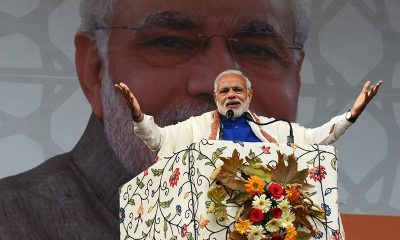By
Abid Bashir
On November 7, Srinagar, the summer capital of Jammu and Kashmir State in Indian administered Kashmir, was dotted with police and other forces personnel. The gala arrangements were being put in place to host Indian Prime Minister Narendra Modi at Sher-e-Kashmir Cricket Stadium in the city.
The venue was made out of bounds for the common man three days ahead of the Prime Minister’s arrival due to security reasons. Interestingly, the separatist groups, fighting for plebiscite in Kashmir, had called for a parallel march. They had selected a ground called TRC, barely a few hundred meters from the venue where the Prime Minister was scheduled to address the rally. Tempers were high at both ends. Pro-Indian parties known as mainstream parties, especially the ruling People’s Democratic Party (PDP) and Bhartiya Janata Party (BJP), who run the government in Jammu and Kashmir along with a small party called Peoples Conference, were busy decorating the venue and formulating a strategy on how to ensure the presence of a big crowd for the Prime Minister’s rally.
Rolls of concertina wires were placed on roads leading to the Prime Minister’s rally venue and at the same time some 20,000 police and other paramilitary personnel were assigned the job to ensure a round the clock patrol on Srinagar streets. There was a clear-cut direction to security agencies not to allow anybody on the road leading to the Stadium where Modi was scheduled to address a gathering.
At the same time, the government took a decision to foil the separatist rally by directing police to ensure all—top, middle-rung and lower-rung leaders of the various separatist groups, are either placed under house arrest or lodged in various prisons under preventive detention. Senior separatist leaders that include Hurriyat Conference (G) chairman Syed Ali Geelani, Hurriyat Conference(M) chairman Mirwaiz Umar Farooq, who is also the chief cleric at the Kashmir’s grand mosque, and the Jammu and Kashmir Liberation Front (JKLF) chief Muhammad Yasin Malik were kept under detention, six days ahead of the scheduled date for the Prime Minister’s rally. According to police records, some 234 separatist leaders were either detained or placed under house arrest in run up to the Prime Minister’s arrival.
The PDP, the main alliance partner of the BJP in J&K government, literally launched a campaign that the Prime Minister would announce a massive financial package for the people of the State including those who suffered due to last year’s deadly deluge that left thousands of residential and business structures either partially or completely damaged.
And the big day finally arrived. The Prime Minister reached Srinagar amid multi-layer security covers to address a rally of some 15,000 odd men and women, most of them from rural areas of Kashmir, at the highly fortified Stadium. Special Commandoes had already taken over the venue, three days ahead of Modi’s arrival in Srinagar to ensure fool-proof security. The State’s security agencies were on tenterhooks with top security officials holding at least four to five meetings a day to review security arrangements.
Modi was greeted by the J&K’s Chief Minister Mufti Muhammad Sayeed, his daughter and Member of Parliament Mehbooba Mufti, and a team of State ministers from both PDP and BJP on the stage. The Prime Minister announced Rs 80,000 crore financial package for the State. He said the package would change the State’s destiny. He, however, didn’t touch the political aspect of the Kashmir issue that has continued to linger on since 1947. Modi said he doesn’t need any foreign advice on Kashmir and would deal with it (Kashmir) the way his predecessor and senior BJP leader Atal Bihari Vajpayee used to. Interestingly, Vajpayee had made an announcement in Kashmir on April 18, 2003, “Kashmir issue needs to be discussed within the ambit of humanity.” However, this time around, Prime Minister Modi preferred to skip talking much about the Kashmir issue.
The former Chief Minister of Jammu and Kashmir, Omar Abdullah, who also heads the largest opposition party National Conference, criticized the Prime Minister for not talking much about the Kashmir issue and not inviting separatist leadership for talks. Omar also castigated Modi for ignoring flood victims of Kashmir in his much talked about financial package of Rs 80,000 Crore. However, the J&K’s finance minister Dr Haseeb Drabu immediately issued a statement that the package had a fixed component of Rs 2000 Core for the rehabilitation of flood-hit victims of last year’s September deluge. The announcement however, didn’t go well with the traders and flood-affected people terming the Rs 2000 Crore a cruel joke with them.
On the other hand, the separatist leadership flooded newspaper offices with statements terming the Prime Minister’s visit a failure and the package a deception. “International community knows that the Kashmir issue needs a political resolution. Had it been an economic issue, it would have been resolved as the Government of India announced many such packages in the past 60 years, but that couldn’t change the basic nature of the Kashmir dispute,” said ailing Hurriyat Conference(G) chairman Syed Ali Geelani. “Caging the separatist leadership and imposing curbs on roads won’t suppress the genuine sentiment of people, who yearn for the right to self determination. Our struggle would continue till the last Indian soldier leaves Kashmir.”
The Hurriyat Conference (M) chairman Mirwaiz Umar Farooq echoed similar views. “Package announced by Modi is mere eye-wash. The Kashmir issue is recognized at world level. Arranging a rally under the garb of military might and by caging separatist leadership across Kashmir is something the world community must look into,” Mirwaiz said. “We have seen the fate of financial packages in the past. They are confined to announcement only. And even if money reaches Kashmir, that won’t change the nature of Kashmir issue.”
According to government officials, the major portion of the package is to construct bridges, schools, roads, hospitals and other business infrastrucres in Jammu and Kashmir.
The larger question remains— Will Modi’s package cast a shadow on the 60-year-old Kashmir issue? The answer, perhaps, lies in the common man’s thinking. “Money has been pumped into Kashmir by the Government of India like anything since 1947. The Kashmir issue is still alive and ticking in the hearts and minds of every Kashmiri citizen and will remain till the goal of freedom is achieved,” said Muhammad Yasin Khan, head of the Traders’ body in Kashmir.



No Comments Yet!
You can be first to comment this post!